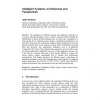Free Online Productivity Tools
i2Speak
i2Symbol
i2OCR
iTex2Img
iWeb2Print
iWeb2Shot
i2Type
iPdf2Split
iPdf2Merge
i2Bopomofo
i2Arabic
i2Style
i2Image
i2PDF
iLatex2Rtf
Sci2ools
CORR
2004
Springer
2004
Springer
Intelligent Systems: Architectures and Perspectives
: The integration of different learning and adaptation techniques to overcome individual limitations and to achieve synergetic effects through the hybridization or fusion of these techniques has, in recent years, contributed to a large number of new intelligent system designs. Computational intelligence is an innovative framework for constructing intelligent hybrid architectures involving Neural Networks (NN), Fuzzy Inference Systems (FIS), Probabilistic Reasoning (PR) and derivative free optimization techniques such as Evolutionary Computation (EC). Most of these hybridization approaches, however, follow an ad hoc design methodology, justified by success in certain application domains. Due to the lack of a common framework it often remains difficult to compare the various hybrid systems conceptually and to evaluate their performance comparatively. This chapter introduces the different generic architectures for integrating intelligent systems. The designing aspects and perspectives of ...
CORR 2004 | Derivative Free Optimization | Education | Fuzzy Inference Systems | Intelligent Hybrid Architectures |
| Added | 17 Dec 2010 |
| Updated | 17 Dec 2010 |
| Type | Journal |
| Year | 2004 |
| Where | CORR |
| Authors | Ajith Abraham |
Comments (0)

